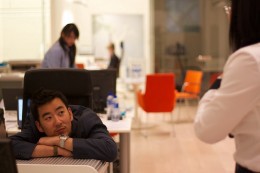Burning Out

I have a tendency to stay late at the office; I enjoy the quiet, the fact that there is less news going on, and that there are fewer distractions. “Go home,” people like to tell me. But I have things to do! I counter. This is the time I can get things done! “Don’t want to see you burning out,” they say.
Glynnis MacNicol writes in Elle about what it’s like to really burn out — to become a person who can barely function anymore. MacNicol was a top editor and writer who says she had a high-paying dream job until she just couldn’t do it anymore. She quit her job and “did nothing” but watch Golden Girls reruns on The Hallmark Channel.
I was badly burned out. Which, as it turns out, is not the same as being tired out, stressed out, bored, or in need of a vacation. It’s more like all those things wrapped together, times ten, plus a lobotomy.
“Burnout happens when you’ve been experiencing chronic stress for so long that your body and your emotional system have begun to shut down and are operating in survival mode,” says Dr. Sara Denning, a clinical psychologist based in Manhattan who specializes in dealing with stress and anxiety. “You numb out because you can’t think. You can’t even make decisions anymore.”
Bingo.
The description here is a good. We often say that we feel burned out, when what we really mean is that we’re overworked, tired, and in desperate need of a vacation. I have never experienced actual burnout to the point that I felt numb and couldn’t do my job anymore. Even under the most difficult circumstances, I’ve been able to complete the task at hand. But I have felt the burn; I have been on the brink. And the best cure has always been to take a break from it all.
MacNicol describes talking to experts who say they see burnout occurring earlier and earlier; she says she was in her mid-thirties when she burned out, but Dr. Sara Denning says she treats patients as young as 22. One of the reasons for this is due to the way modern technology works. We go to work, and then we go home, but it is entirely possible to go home and feel as if we are still working if going home means staring at our computers some more, or reading work emails on our smartphones. What we need to be doing for ourselves is putting down our devices and actually being “home” at home.
Ultimately, MacNicol argues, the answer to burnout prevention is “less of an individual decision and more of a collective one.” It’s easier for individuals to choose work-life balance if employers support it too (see: Patagonia). We’re too young to be burning out.
Photo: Swedish Pavilion
Support The Billfold
The Billfold continues to exist thanks to support from our readers. Help us continue to do our work by making a monthly pledge on Patreon or a one-time-only contribution through PayPal.
Comments